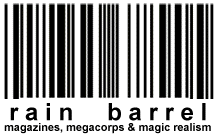
January 30, 2001

January 30, 2001
|
Unless you are a librarian in the know, it is unlikely that you have heard of Questia. While the company launched sometime this month, I don't believe they have started an advertising campaign. (I've since learned that they have launched at TV ad campaign during the "March Madness" college basketball tourney) So by way of introduction, from the Questia website, founder Troy Williams gives us ... A
Short History of Questia.
I'll tell you what the big deal is: Questia has raised over $135 million in venture capital to date. And look at their Board of Directors: Rod Canion - Chairman
of the Board, Founder of Compaq Computer Corporation
Now do you understand why I am so disturbed by Questia? I'm an academic librarian and I bust my butt to stretch every dollar that we get from an underfunded university. And now I learn that the leaders of some of the most powerful companies in the world have decided that the non-profit sector of librarianship is ripe for personal profit. I'm a little freaked.
And
yet
I'm also a little perplexed.
In spite of all the money and clout they have, I can't see how Questia can possibly succeed. Their largest competition - libraries - already gives similar access to the same "product" - electronic books and journal articles - for free. * From the Questia FAQ:
Now, in order to make $135 million, Questia needs 375,000 annual subscriptions. In its FAQ, Questia says there are 12 million undergraduates in the United States. That sounds like an impressive pool to draw from but Questia's services are geared towards only liberal arts students: there is no business, science, engineering or professional material in Questia. So, their target market is probably considerably less than 12 million which means that their market share will have to be considerably higher. Can I mention again that many libraries perform the same ebook service as Questia does (albeit at a smaller scale) for free? And what about those libraries that do not offer ebook services yet? Are their students ripe for Questia's picking? Hardly. Thanks to the volunteer work by such folks as Project Guttenburg, hundreds of publications in the public domain - like the works of Shakespeare - are available for free on the web. And for those modern critical works that are only available at the library in book form - well, students can check the online catalogue from home to see if they are available and then when they are on campus, drop by the library and pick them up to read later at home. I know, how awful!
But tell me then: Would you rather read an entire book from a screen? Questia has assured publishers that the books in their system will not be printed out or copied in entirety. Questia prevents this by showing one page of a document at a time. This means you have be online when you read or print the material, page by page. So is Questia so forward thinking that they are betting the farm that a portable electronic reading device will become commonplace? And if so, which one? Are they positioning themselves for the time when electronic paper becomes available? Or does Questia think so little of liberal arts students that they assume that no one is actually going to want to read an entire book with their service. Do they think so little of research that they think it is primarily gleaning quotes for papers? With all that Questia is going to be up against, it makes you think that they must have a kick ass marketing scheme up their sleeve that will be guaranteed to bring in the students and thus, the dollars. But then you read...
*
Question Marquis, I've accepted the challenge of your $135 million dollar gauntlet. May the best library win. |
|